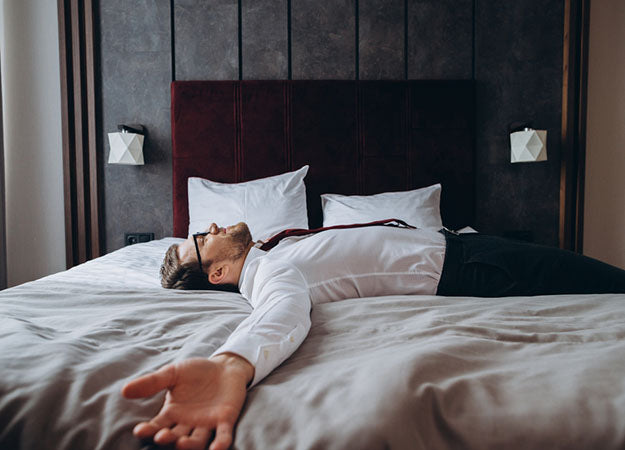
eldar nurkovic/Shutterstock
Embarking on an adventure across time zones is one of travel’s most exhilarating aspects, but it often comes with an unwelcome companion: jet lag. That groggy, out-of-sync feeling can turn the start of a vacation or business trip into a challenge, making you long for the comfort of your bed just when you should be exploring or preparing for an important meeting. But fear not, because there are strategies to beat jet lag at its own game and reclaim your sleep — and your trip.
Understanding Jet Lag
Your body operates on a natural internal clock, or circadian rhythm, that cues you when to wake up and sleep, all based on the cycle of daylight and darkness. Now, this internal clock doesn’t instantly adjust when you travel quickly across time zones. It’s still stuck in your departure city’s time, leading to the misalignment known as jet lag.
The impact of jet lag varies widely among individuals. For instance, flying east could make it difficult for you to sleep, while westward journeys could make waking up earlier harder than usual. The extent of jet lag also depends on how many time zones you’ve crossed — more zones usually mean more disruption. There’s also a personal element. Everyone’s body reacts differently, with some people snapping back quickly while others may feel out of sorts for days.
Pre-Travel Preparation
Before you jet off, a little prep can go a long way in easing jet lag’s grip:
Adjust sleep schedule: Start by gently nudging your sleep schedule closer to the rhythm of your destination a few days before departure. If you’re heading east, try going to bed an hour earlier each night, and if your compass points west, delay bedtime instead. This gradual shift can help your body ease into the new time zone a bit more gracefully.
Stay hydrated: Hydration is your best friend when it comes to travel. Drink plenty of water before, during and after your flight to keep jet lag’s pesky symptoms at bay. Airplane cabins are notoriously dry, and staying hydrated helps mitigate fatigue and ensures you arrive feeling fresher.
Consider your diet: What you eat also affects how you adjust. Heavier, rich foods can weigh you down and disrupt your sleep cycle, so lean toward lighter meals that are easier on your system. Incorporating more fruits and vegetables before your trip can help, too, setting you up for a smoother adjustment to the new time zone.
Strategies During Flight
Navigating the skies doesn’t mean you have to lose sleep over jet lag. Let’s examine some mid-flight strategies you can take:
Light exposure: Managing light exposure is crucial in resetting your internal clock. If you’re flying into the night, try to mimic the darkness of your destination by using an eye mask or dimming your screen. Conversely, if you’re chasing the sun, keep your environment bright. This simple trick can help nudge your body’s rhythm in the right direction.
Sleep on the plane: Catching some Zs on a plane is an art form. Equip yourself with an eye mask and earplugs to block out cabin lights and noise. Dressing in layers and opting for comfortable, loose-fitting clothing can also affect how well you rest. A small travel pillow or blanket can add that extra touch of comfort, turning your seat into a cozy nook for sleep.
Staying active: Don’t forget to move around. Long flights can leave you feeling stiff and contribute to jet lag. Make it a point to stand up, walk down the aisles or do some simple stretches every now and then. This approach not only promotes blood circulation but also helps you feel more refreshed upon arrival.

Dmytro Sheremeta/Shutterstock
Post-Arrival Tactics
Once you’ve landed, the real challenge in beating jet lag begins. Here are post-arrival tactics to consider:
Sync with local time: Sync up with the local time as swiftly as possible. If it’s daytime when you arrive, resist the urge to hit the sheets immediately. Instead, dive into the rhythm of your new surroundings. Engage in light activities, explore a bit or simply soak in the local ambiance to reset your internal clock to the current time zone.
Natural light exposure: Sunlight is your ally in this adjustment period. Natural light is a powerful cue for your body, signaling when it’s time to be awake. Try to get outside and bask in the daylight, especially in the morning.
Sleep hygiene: Establishing a bedtime routine for adults can significantly improve your ability to adjust to a new time zone and enhance your overall sleep quality. Limit exposure to screens and blue light in the evening, as these can hinder the production of melatonin, your body’s sleep hormone. Also, ensure your sleeping area is quiet, dark and cool to foster optimal sleeping conditions.
Short naps: If you’re grappling with fatigue, short naps can be a temporary fix. Aim for 20 to 30 minutes to avoid diving too deep into the sleep cycle, which can leave you feeling groggier and more disoriented. Time these brief snoozes early in the afternoon to minimize the impact on your nighttime sleep.
Additional Tips and Tricks
Here are some other tips and tricks to help combat jet lag:
Sleep aids and supplements: Sleep aids or natural supplements can be helpful in the short term, nudging your body toward rest when it stubbornly clings to another time zone. However, it’s important to tread lightly. Sleep aids can sometimes lead to dependency or disrupt your natural sleep cycle if used too frequently. Always consult with a healthcare professional before adding any new supplement to your routine.
Mindfulness and relaxation techniques: Practices like meditation or deep breathing exercises before bedtime can ease your mind, reduce stress and prepare your body for sleep. Even a few minutes can significantly affect how quickly you fall asleep and the quality of your rest.
Physical activity: Light physical activity can also effectively mitigate jet lag. A brisk walk or a gentle yoga session can do wonders for resetting your internal clock. Exercise stimulates alertness during the day, making it easier to fall asleep at night. However, it’s best to avoid intense workouts close to bedtime, as they can increase your energy levels, making it harder to sleep.
Sleep Better with Quality Bedding
Wrapping Up
Travel broadens your horizons, but it also challenges your body in unique ways. However, implementing these tips for your next trip can minimize jet lag’s impact on your well-being. But remember, the foundation of good sleep, whether at home or abroad, starts with where you rest your head at night.
At City Mattress, we understand the crucial role that quality bedding plays in achieving restorative sleep. A firm mattress can offer the support your body needs to relax fully, allowing you to wake up feeling refreshed and ready to tackle the day — or any lingering jet lag. And when it comes to selecting a mattress that combines comfort with durability, a Serta mattress promises to give you comfort, night after night. Dive into the world of quality sleep solutions at City Mattress today.
